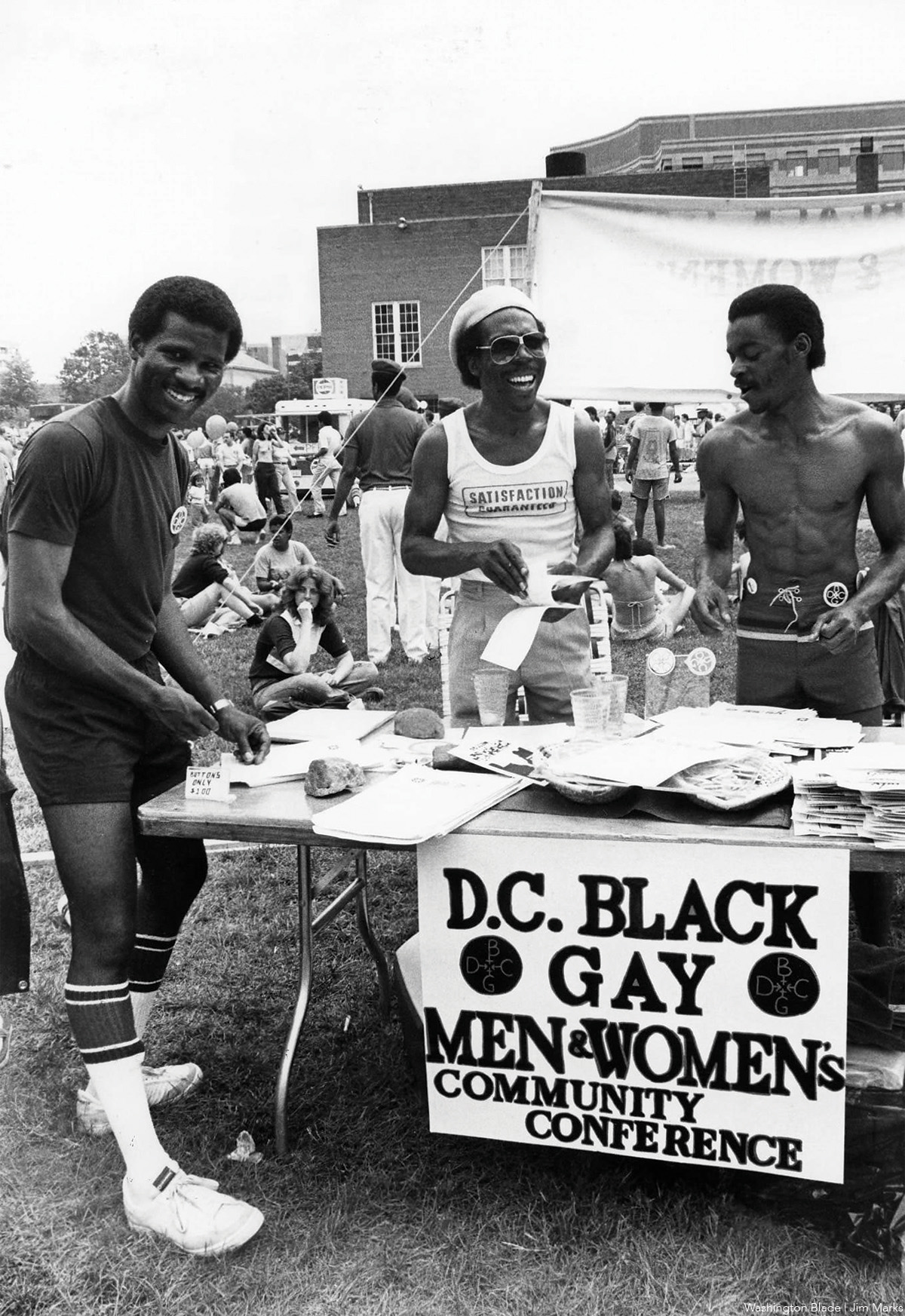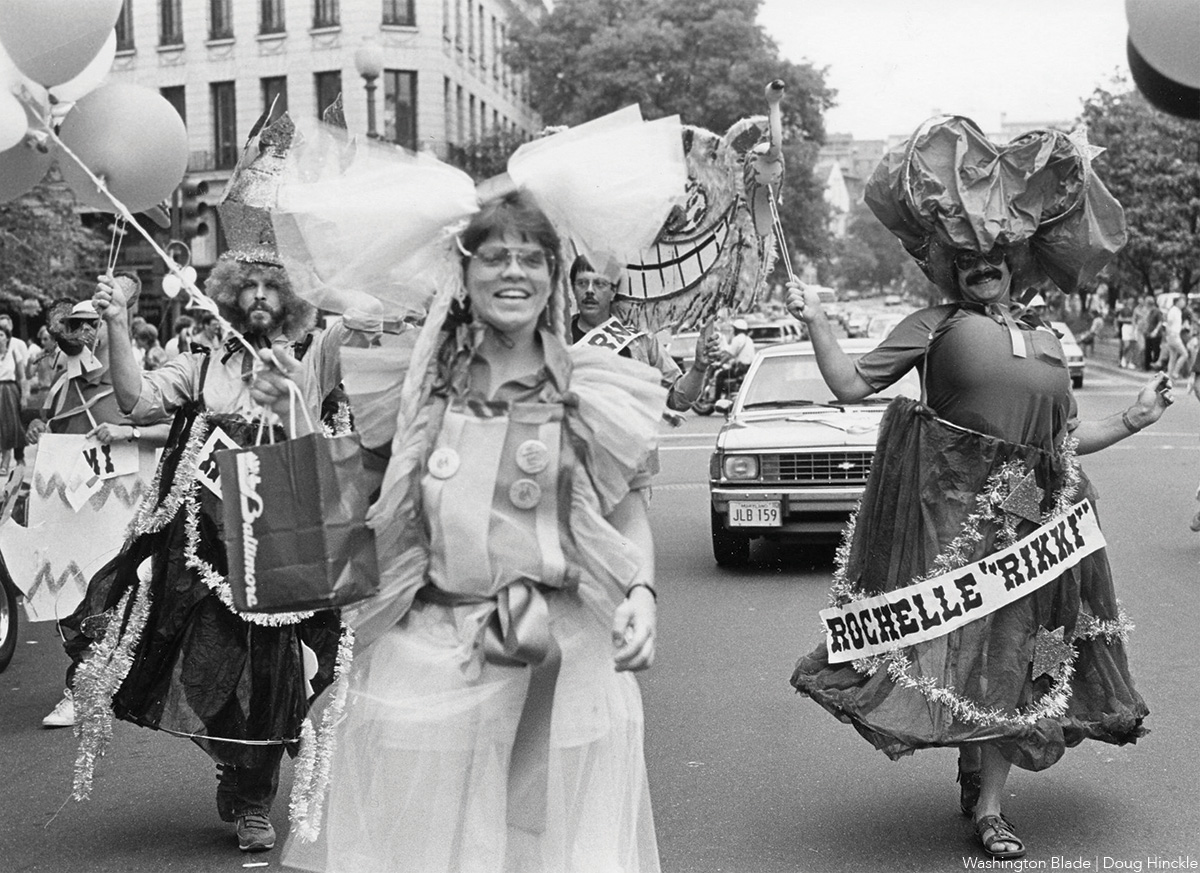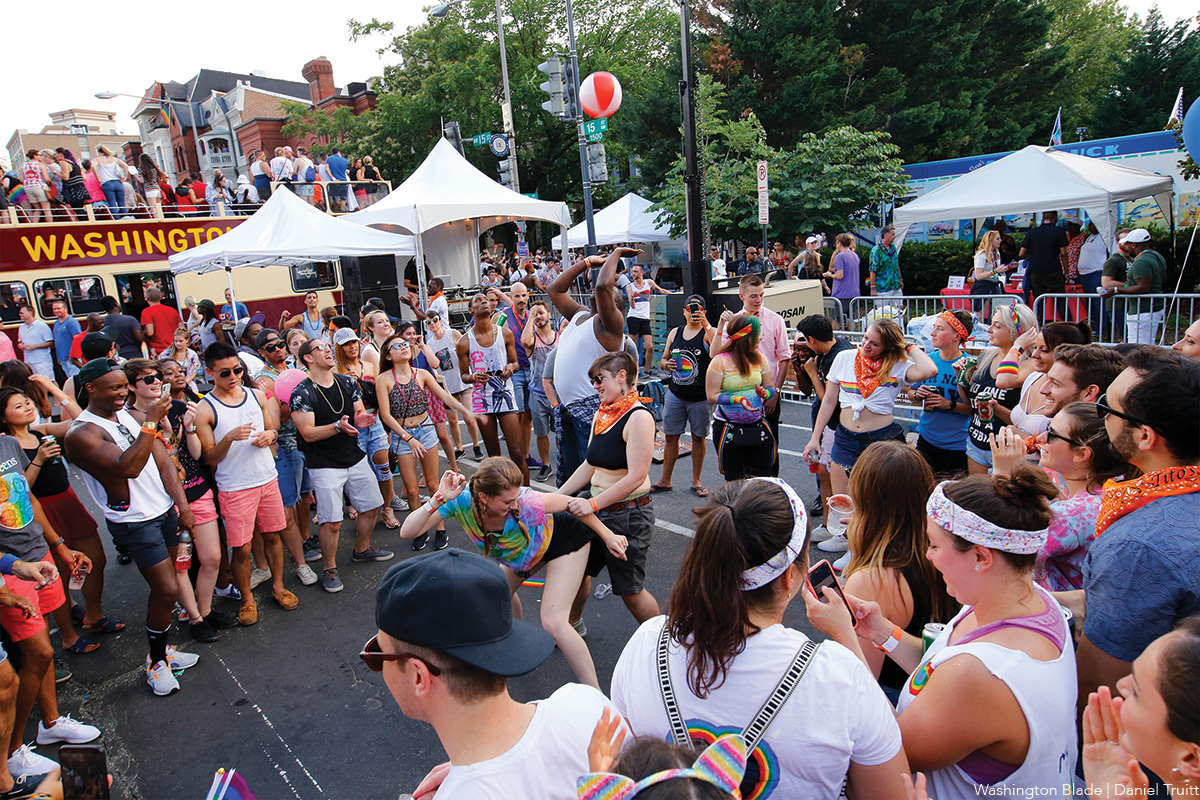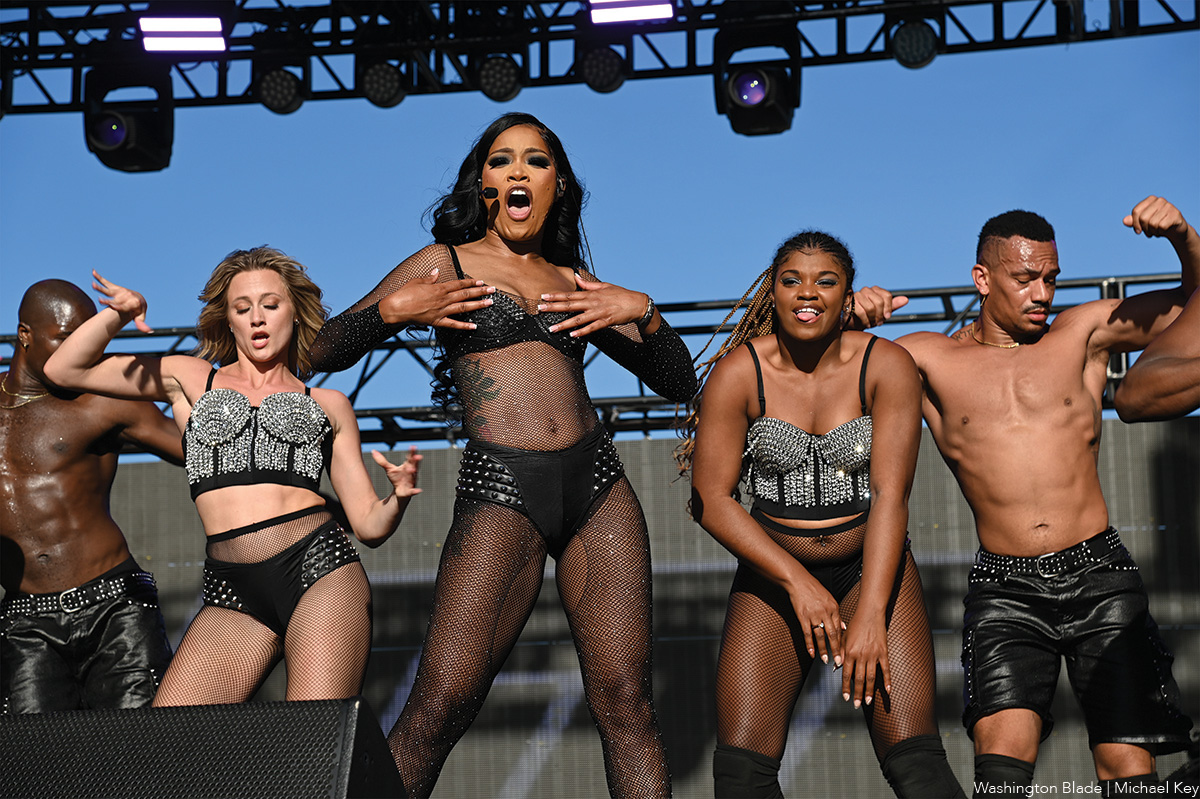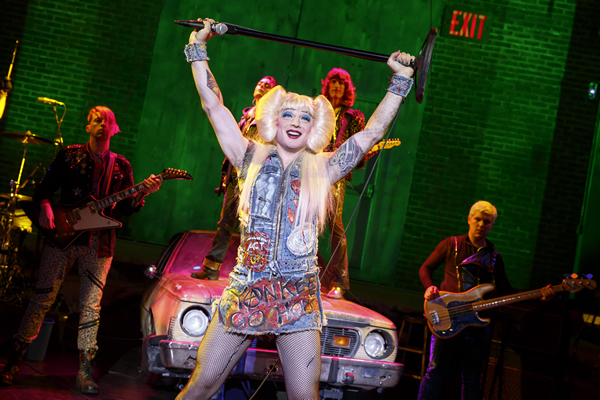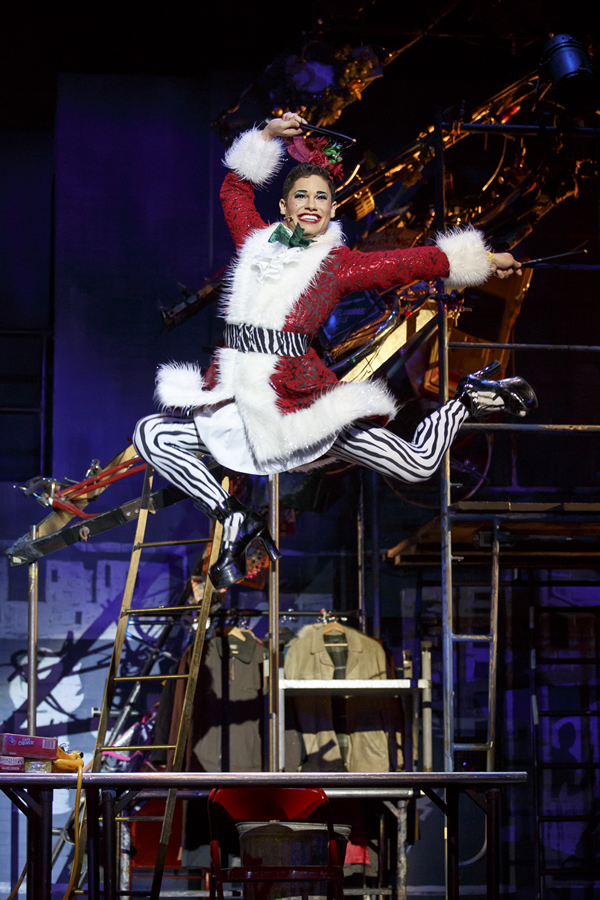a&e features
Touring productions of ‘Hedwig,’ ‘Rent’ arrive in Washington
‘90s hits broke ground on stage with frank, funny portrayals of queer lives
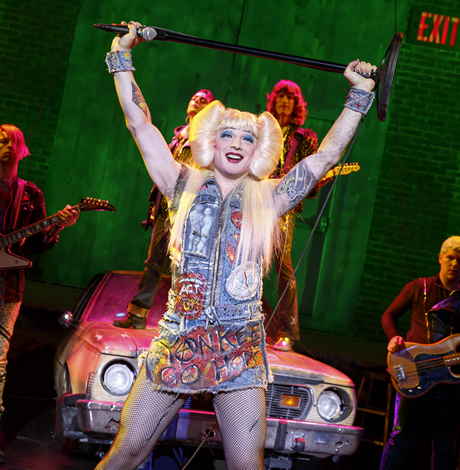
‘Hedwig and the Angry Inch’
Through July 2
The Kennedy Center
Tickets start at $59
202-467-4600
‘Rent’
June 20-25
National Theatre
1321 Pennsylvania Ave., N.W.
Tickets start at $48
800-514-3849
Two of the best musicals to come out of the 1990s were “Hedwig and the Angry Inch,” memoir meets rock concert, and “Rent,” a modern take on Puccini’s “La Bohème” exploring a year in the life of bohemian friends living in New York’s Alphabet City. Both enduring works feature unforgettable genderqueer characters. And now tours of both shows are overlapping in D.C.
Out actor/writer/director John Cameron Mitchell wrote “Hedwig’s” book and created the title role off Broadway in 1998. Composer Stephen Trask supplied the hard-driving score. Hedwig’s back story is riveting: Wannabe glam rock star undergoes botched gender reassignment surgery to escape East Germany for America. And that’s not that half of it. In a night, Hedwig reminisces via songs backed by the hard-rocking band the Angry Inch, and inimitably fills in the gaps.
Mitchell developed the Hedwig character in downtown New York clubs. He’s said that Hedwig is not a trans woman, but a genderqueer character. “She’s more than a woman or a man. She’s a gender of one and that is accidentally so beautiful.”
A successful revival of “Hedwig” opened on Broadway in 2014 and currently acclaimed actor Euan Morton is playing the title role in that production’s national tour. With his gorgeous soaring tenor, Morton arguably has the finest voice of the actors who’ve donned Hedwig’s wild blonde wig (a heady roster that in addition to Mitchell includes Neil Patrick Harris, Andrew Rennells, Darren Criss, Taye Diggs and D.C.’s own Rick Hammerly who won a Helen Hayes Award for his efforts).
“The score is definitely an odd combo and ballads and rock songs and requires some serious vocal acrobatics,” Morton says. “The day following a performance, I can barely speak which means I can no longer sing in the shower which is one of my favorite things. I really have to be careful, but it’s worth it — anything for the pleasure of performing this role.”
It’s fair to say he’s fallen in love with part.
“To be honest, I first really got a handle on the part when I was cast and sent to the script,” he says. “When I sat down and actually read the script, I wasn’t sure this was something for me, but I’m up for a challenge. We’re brought up being told where our box end. It’s good to go outside that box every now and then.”
Morton received a Tony Award nomination for his sensational portrayal of ‘80s icon Boy George in “Taboo.” And while playing Boy George prepared Morton to wear a lot of makeup and some wild outfits, he says that’s where it ends. No past part or any other actor’s interpretation of the role has influenced his take on the part.
“She is strong, aggressive, sexy and has led a very large life. Hedwig takes the actors who play her and molds them and uses them for her ends and not the other way around. It’s a not a character you can force. I’ve taken my cues from Hedwig.”
Morton, 39, didn’t do extensive research prior to joining the tour in November.
“My entire life has been an investigation into all things transgender. I was lucky enough to leave home when I was very young. And have been living and working with cisgender, transgender, non-binary gays and straights ever since. I’ve experienced this story through life. I’ve seen and can empathize but never really know what this is — the years of questioning and the pain. But I hope our tour can be for those on the journey to see people like themselves on stage.”
Born in Scotland, Morton left home early to study theater in London. Career highlights include Broadway’s “Taboo” and the lead in Ford’s Theatre production of “Parade” for which he deservedly snagged a Helen Hayes Award. Morton is married to theater producer Lee Armitage and their son is Iain Armitage the adorable boy theater critic who’s currently embarking on a big acting career. In March, CBS announced that it had ordered to series “Young Sheldon,” a prequel to the sitcom “The Big Bang Theory,” starring young Armitage as the title character.
Morton says “Hedwig’s” concert feel is part of what makes it work.
“She spends an hour and forty minutes talking directly to the audience. She’s doing her thing present day which allows me to bring in some Trump jokes. There’s no division between what’s happening and the audience. If you want to be part of the art rather than just an observer than come see the show.”
Out actor David Merino is currently making his professional debut playing Angel in the 20th anniversary tour of “Rent.” Merino was born in 1995 just months before “Rent” opened on Broadway in the spring of 1996.
“It’s meaningful for me to be part of this particular tour. To play this character and be part of this story and show at this time in this country is incredible. I’m happy that this is my job. The fact that the show and I are the same age is not lost on me. This story and the characters still resonate strongly.”
Angel is a drag queen and talented drummer who makes her money performing on the street. She and her partner Tom Collins are both dealing with having HIV and very little resources. Angel’s spotlight moment is the high energy number “Today For You Tomorrow For Me” which she sings costumed in a saucy Santa suit.
The tour is Merino’s third time playing Angel. Originally he assayed the role with a group of high school friends who formed their own company in his native Los Angeles. More recently he played Angel in college production at New York University where he was noticed by Broadway casting agents. He’s interrupted his studies to go on the road with the tour.
Merino took time to understand an era when people were dying from AIDS-related complications at a terrifying rate.
“I had to fill the gap with research and dive in,” he says. “I had to watch documentaries about covering pop culture and AIDS to figure out it. It wasn’t difficult to modernize Angel. But it was important for me to get across that’s she’s not a frivolous party person. She emanates a lot of love and light. She wasn’t a frivolous person.”
“I’ve never known a person like Angel in my own life. To portray her I had to discover her on my own. Now I work to bring her to the stage and show her to people.”
Coming out was difficult for Merino. His family didn’t understand his sexuality or his love for theater. In his teen years, he spent hours secretly watching the screen version of “Rent” again and again. Within the last several years his family has grown proud and supportive, he says. And for that Merino is very grateful.
Not everyone is comfortable with the material “Rent” or “Hedwig.” For Merino, touring with “Rent” through red states during campaign season was poignant. He felt an obligation to bring the musicals stories to those who valued them and those who had never heard them before.
“And it’s not just subject matter,” Morton says. “Hedwig’s score is very punk rock. It’s not everyone’s cup of tea. One audience member who left midway famously commented, ‘I thought this was a show about Harry Potter’s owl.’”
Both Morton and Merino leave their respective tours after Washington. Merino plans to finish up his degree at New York University. And Morton says he’s eager to get back to singing Whitney Houston songs in the shower again.
a&e features
Visit Cambridge, a ‘beautiful secret’ on Maryland’s Eastern Shore
New organization promotes town’s welcoming vibe, LGBTQ inclusion

CAMBRIDGE, Md. — Driving through this scenic, historic town on Maryland’s Eastern Shore, you’ll be charmed by streets lined with unique shops, restaurants, and beautifully restored Victorian homes. You’ll also be struck by the number of LGBTQ Pride flags flying throughout the town.
The flags are a reassuring signal that everyone is welcome here, despite the town’s location in ruby red Dorchester County, which voted for Donald Trump over Kamala Harris by a lopsided margin. But don’t let that deter you from visiting. A new organization, Proudly Cambridge, is holding its debut Pride event this weekend, touting the town’s welcoming, inclusive culture.
“We stumbled on a beautiful secret and we wanted to help get the word out,” said James Lumalcuri of the effort to create Proudly Cambridge.
The organization celebrates diversity, enhances public spaces, and seeks to uplift all that Cambridge has to share, according to its mission statement, under the tagline “You Belong Here.”
The group has so far held informal movie nights and a picnic and garden party; the launch party is June 28 at the Cambridge Yacht Club, which will feature a Pride celebration and tea dance. The event’s 75 tickets sold out quickly and proceeds benefit DoCo Pride.
“Tickets went faster than we imagined and we’re bummed we can’t welcome everyone who wanted to come,” Lumalcuri said, adding that organizers plan to make “Cheers on the Choptank” an annual event with added capacity next year.
One of the group’s first projects was to distribute free Pride flags to anyone who requested one and the result is a visually striking display of a large number of flags flying all over town. Up next: Proudly Cambridge plans to roll out a program offering affirming businesses rainbow crab stickers to show their inclusiveness and LGBTQ support. The group also wants to engage with potential visitors and homebuyers.
“We want to spread the word outside of Cambridge — in D.C. and Baltimore — who don’t know about Cambridge,” Lumalcuri said. “We want them to come and know we are a safe haven. You can exist here and feel comfortable and supported by neighbors in a way that we didn’t anticipate when we moved here.”

Lumalcuri, 53, a federal government employee, and his husband, Lou Cardenas, 62, a Realtor, purchased a Victorian house in Cambridge in 2021 and embarked on an extensive renovation. The couple also owns a home in Adams Morgan in D.C.
“We saw the opportunity here and wanted to share it with others,” Cardenas said. “There’s lots of housing inventory in the $300-400,000 range … we’re not here to gentrify people out of town because a lot of these homes are just empty and need to be fixed up and we’re happy to be a part of that.”
Lumalcuri was talking with friends one Sunday last year at the gazebo (affectionately known as the “gayzebo” by locals) at the Yacht Club and the idea for Proudly Cambridge was born. The founding board members are Lumalcuri, Corey van Vlymen, Brian Orjuela, Lauren Mross, and Caleb Holland. The group is currently working toward forming a 501(c)3.
“We need visibility and support for those who need it,” Mross said. “We started making lists of what we wanted to do and the five of us ran with it. We started meeting weekly and solidified what we wanted to do.”
Mross, 50, a brand strategist and web designer, moved to Cambridge from Atlanta with her wife three years ago. They knew they wanted to be near the water and farther north and began researching their options when they discovered Cambridge.
“I had not heard of Cambridge but the location seemed perfect,” she said. “I pointed on a map and said this is where we’re going to move.”
The couple packed up, bought a camper trailer and parked it in different campsites but kept coming back to Cambridge.
“I didn’t know how right it was until we moved here,” she said. “It’s the most welcoming place … there’s an energy vortex here – how did so many cool, progressive people end up in one place?”
Corey van Vlymen and his husband live in D.C. and were looking for a second home. They considered Lost River, W.Va., but decided they preferred to be on the water.
“We looked at a map on both sides of the bay and came to Cambridge on a Saturday and bought a house that day,” said van Vlymen, 39, a senior scientist at Booz Allen Hamilton. They’ve owned in Cambridge for two years.
They were drawn to Cambridge due to its location on the water, the affordable housing inventory, and its proximity to D.C.; it’s about an hour and 20 minutes away.
Now, through the work of Proudly Cambridge, they hope to highlight the town’s many attributes to residents and visitors alike.
“Something we all agree on is there’s a perception problem for Cambridge and a lack of awareness,” van Vlymen said. “If you tell someone you’re going to Cambridge, chances are they think, ‘England or Massachusetts?’”
He cited the affordability and the opportunity to save older, historic homes as a big draw for buyers.
“It’s all about celebrating all the things that make Cambridge great,” Mross added. “Our monthly social events are joyful and celebratory.” A recent game night drew about 70 people.
She noted that the goal is not to gentrify the town and push longtime residents out, but to uplift all the people who are already there while welcoming new visitors and future residents.
They also noted that Proudly Cambridge does not seek to supplant existing Pride-focused organizations. Dorchester County Pride organizes countywide Pride events and Delmarva Pride was held in nearby Easton two weeks ago.
“We celebrate all diversity but are gay powered and gay led,” Mross noted.
To learn more about Proudly Cambridge, visit the group on Facebook and Instagram.
What to see and do
Cambridge, located 13 miles up the Choptank River from the Chesapeake Bay, has a population of roughly 15,000. It was settled in 1684 and named for the English university town in 1686. It is home to the Harriet Tubman Museum, mural, and monument. Its proximity to the Blackwater National Wildlife Refuge makes it a popular stop for birders, drawn to more than 27,000 acres of marshland dubbed “the Everglades of the north.”
The refuge is walkable, bikeable, and driveable, making it an accessible attraction for all. There are kayaking and biking tours through Blackwater Adventures (blackwateradventuresmd.com).
Back in town, take a stroll along the water and through historic downtown and admire the architecture. Take in the striking Harriet Tubman mural (424 Race St.). Shop in the many local boutiques, and don’t miss the gay-owned Shorelife Home and Gifts (421 Race St.), filled with stylish coastal décor items.
Stop for breakfast or lunch at Black Water Bakery (429 Race St.), which offers a full compliment of coffee drinks along with a build-your-own mimosa bar and a full menu of creative cocktails.
The Cambridge Yacht Club (1 Mill St.) is always bustling but you need to be a member to get in. Snapper’s on the water is temporarily closed for renovations. RaR Brewing (rarbrewing.com) is popular for craft beers served in an 80-year-old former pool hall and bowling alley. The menu offers burgers, wings, and other bar fare.
For dinner or wine, don’t miss the fantastic Vintage 414 (414 Race St.), which offers lunch, dinner, wine tasting events, specialty foods, and a large selection of wines. The homemade cheddar crackers, inventive flatbreads, and creative desserts (citrus olive oil cake, carrot cake trifle) were a hit on a recent visit.
Also nearby is Ava’s (305 High St.), a regional chain offering outstanding Italian dishes, pizzas, and more.
For something off the beaten path, visit Emily’s Produce (22143 Church Creek Rd.) for its nursery, produce, and prepared meals.
“Ten minutes into the sticks there’s a place called Emily’s Produce, where you can pay $5 and walk through a field and pick sunflowers, blueberries, you can feed the goats … and they have great food,” van Vlymen said.
As for accommodations, there’s the Hyatt Regency Chesapeake Bay (100 Heron Blvd. at Route 50), a resort complex with golf course, spa, and marina. Otherwise, check out Airbnb and VRBO for short-term rentals closer to downtown.
Its proximity to D.C. and Baltimore makes Cambridge an ideal weekend getaway. The large LGBTQ population is welcoming and they are happy to talk up their town and show you around.
“There’s a closeness among the neighbors that I wasn’t feeling in D.C.,” Lumalcuri said. “We look after each other.”
a&e features
James Baldwin bio shows how much of his life is revealed in his work
‘A Love Story’ is first major book on acclaimed author’s life in 30 years

‘Baldwin: A Love Story’
By Nicholas Boggs
c.2025, FSG
$35/704 pages
“Baldwin: A Love Story” is a sympathetic biography, the first major one in 30 years, of acclaimed Black gay writer James Baldwin. Drawing on Baldwin’s fiction, essays, and letters, Nicolas Boggs, a white writer who rediscovered and co-edited a new edition of a long-lost Baldwin book, explores Baldwin’s life and work through focusing on his lovers, mentors, and inspirations.
The book begins with a quick look at Baldwin’s childhood in Harlem, and his difficult relationship with his religious, angry stepfather. Baldwin’s experience with Orilla Miller, a white teacher who encouraged the boy’s writing and took him to plays and movies, even against his father’s wishes, helped shape his life and tempered his feelings toward white people. When Baldwin later joined a church and became a child preacher, though, he felt conflicted between academic success and religious demands, even denouncing Miller at one point. In a fascinating late essay, Baldwin also described his teenage sexual relationship with a mobster, who showed him off in public.
Baldwin’s romantic life was complicated, as he preferred men who were not outwardly gay. Indeed, many would marry women and have children while also involved with Baldwin. Still, they would often remain friends and enabled Baldwin’s work. Lucien Happersberger, who met Baldwin while both were living in Paris, sent him to a Swiss village, where he wrote his first novel, “Go Tell It on the Mountain,” as well as an essay, “Stranger in the Village,” about the oddness of being the first Black person many villagers had ever seen. Baldwin met Turkish actor Engin Cezzar in New York at the Actors’ Studio; Baldwin later spent time in Istanbul with Cezzar and his wife, finishing “Another Country” and directing a controversial play about Turkish prisoners that depicted sexuality and gender.
Baldwin collaborated with French artist Yoran Cazac on a children’s book, which later vanished. Boggs writes of his excitement about coming across this book while a student at Yale and how he later interviewed Cazac and his wife while also republishing the book. Baldwin also had many tumultuous sexual relationships with young men whom he tried to mentor and shape, most of which led to drama and despair.
The book carefully examines Baldwin’s development as a writer. “Go Tell It on the Mountain” draws heavily on his early life, giving subtle signs of the main character John’s sexuality, while “Giovanni’s Room” bravely and openly shows a homosexual relationship, highly controversial at the time. “If Beale Street Could Talk” features a woman as its main character and narrator, the first time Baldwin wrote fully through a woman’s perspective. His essays feel deeply personal, even if they do not reveal everything; Lucian is the unnamed visiting friend in one who the police briefly detained along with Baldwin. He found New York too distracting to write, spending his time there with friends and family or on business. He was close friends with modernist painter Beauford Delaney, also gay, who helped Baldwin see that a Black man could thrive as an artist. Delaney would later move to France, staying near Baldwin’s home.
An epilogue has Boggs writing about encountering Baldwin’s work as one of the few white students in a majority-Black school. It helpfully reminds us that Baldwin connects to all who feel different, no matter their race, sexuality, gender, or class. A well-written, easy-flowing biography, with many excerpts from Baldwin’s writing, it shows how much of his life is revealed in his work. Let’s hope it encourages reading the work, either again or for the first time.
a&e features
Looking back at 50 years of Pride in D.C
Washington Blade’s unique archives chronicle highs, lows of our movement
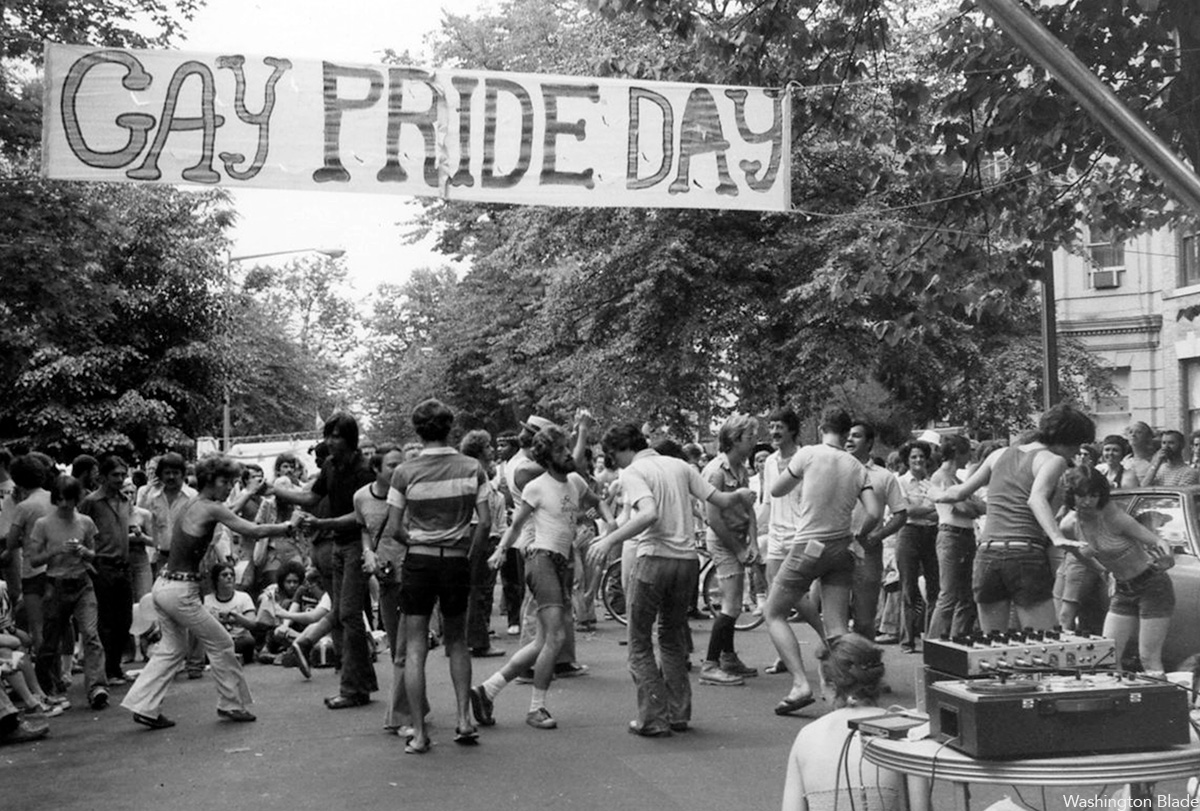
To celebrate the 50th anniversary of LGBTQ Pride in Washington, D.C., the Washington Blade team combed our archives and put together a glossy magazine showcasing five decades of celebrations in the city. Below is a sampling of images from the magazine but be sure to find a print copy starting this week.
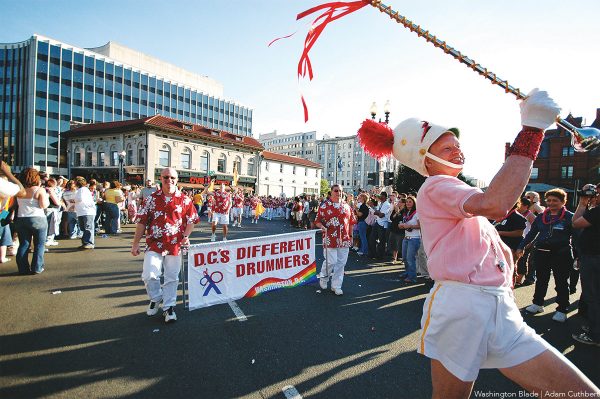
The magazine is being distributed now and is complimentary. You can find copies at LGBTQ bars and restaurants across the city. Or visit the Blade booth at the Pride festival on June 7 and 8 where we will distribute copies.
Thank you to our advertisers and sponsors, whose support has enabled us to distribute the magazine free of charge. And thanks to our dedicated team at the Blade, especially Photo Editor Michael Key, who spent many hours searching the archives for the best images, many of which are unique to the Blade and cannot be found elsewhere. And thanks to our dynamic production team of Meaghan Juba, who designed the magazine, and Phil Rockstroh who managed the process. Stephen Rutgers and Brian Pitts handled sales and marketing and staff writers Lou Chibbaro Jr., Christopher Kane, Michael K. Lavers, Joe Reberkenny along with freelancer and former Blade staffer Joey DiGuglielmo wrote the essays.

The magazine represents more than 50 years of hard work by countless reporters, editors, advertising sales reps, photographers, and other media professionals who have brought you the Washington Blade since 1969.
We hope you enjoy the magazine and keep it as a reminder of all the many ups and downs our local LGBTQ community has experienced over the past 50 years.
I hope you will consider supporting our vital mission by becoming a Blade member today. At a time when reliable, accurate LGBTQ news is more essential than ever, your contribution helps make it possible. With a monthly gift starting at just $7, you’ll ensure that the Blade remains a trusted, free resource for the community — now and for years to come. Click here to help fund LGBTQ journalism.
